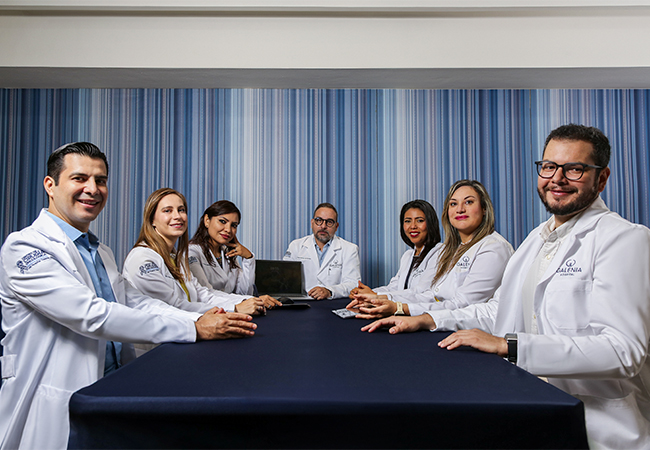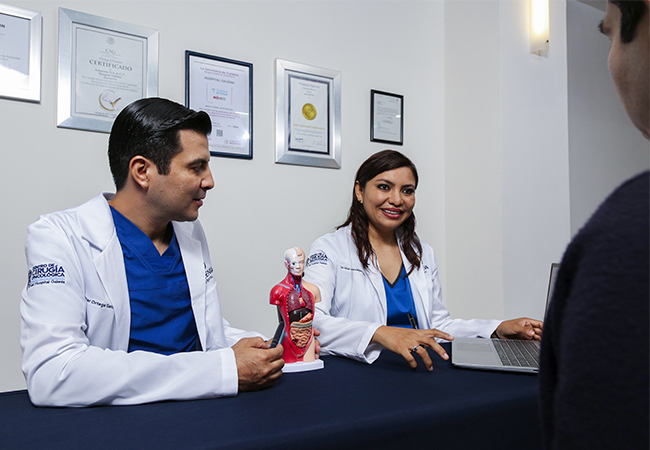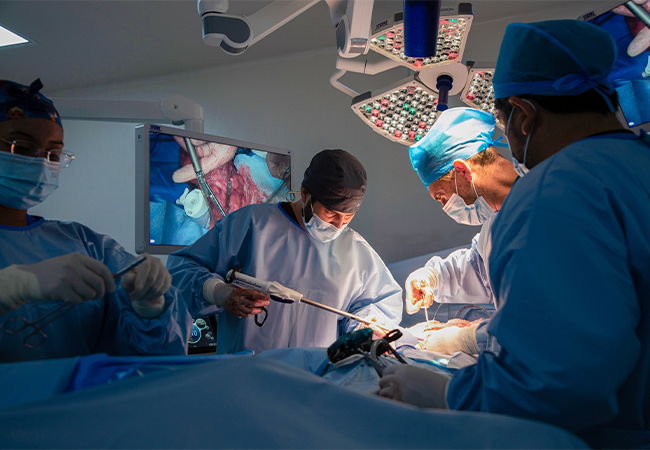Digestive and Minimally Invasive Tumor Clinic
Home
Gynecological Tumor Clinic
Digestive and Minimally Invasive Tumor Clinic
Breast Tumor Clinic
Skin Cancer (Melanoma) and Sarcoma Clinic
Head and Neck Clinic
Minimally Invasive Oncologic Surgery
Minimally invasive surgery is an approach to performing surgical procedures with a lower degree of invasiveness for the patient. In traditional “open” surgery, the surgeon uses a single incision to enter the abdomen. On the other hand, laparoscopic surgery uses several incisions (3 or 4) measuring 5 to 10 mm, through which specialized instruments and a medical-grade camera are introduced, transmitting images to operating room monitors.
The system allows the surgeon to perform the same operations as traditional surgery, but through smaller incisions and with superior visual quality.

Benefits of minimally invasive surgery:
- Shorter recovery.
- Faster return to work.
- Fewer hospital stays.
- Less postoperative pain.
- Better cosmetic results.

What types of surgeries can be performed with laparoscopic surgery?
Most abdominal (gastrointestinal, gynecological, and urological) surgeries, chest surgeries, and some thyroid surgeries can be performed using the minimally invasive technique. Some of the most common cancers that we can currently treat with minimally invasive surgery are:
- Stomach cancer
- Colon and rectal cancer
- Endometrial cancer
- Ovarian cancer
- Kidney cancer
At the Galenia Hospital’s Highly Specialized Oncologic Surgery Center, we are committed to providing the best cancer treatment options for our patients. That’s why we have smart operating rooms with the latest technology, and our staff physicians have formal training in minimally invasive surgery, which allows for excellent cancer outcomes with faster recovery and improved cosmetics.
Oncologic Surgery for Digestive Tumors
Among the many cancers that can currently be treated using minimally invasive techniques are cancers of the digestive system, such as stomach cancer and colon and rectal cancer.

Stomach Cancer
Stomach cancer is often aggressive and, unfortunately, has become increasingly common. Symptoms are often confused with those of gastritis (burning pain in the upper abdomen) and sometimes dark stools (melena).
The cancer must first be examined with an upper endoscopy and subsequently with an abdominal CT scan, and the appropriate treatment is determined based on this.
In general, if the tumor is diagnosed at an early clinical stage, the initial treatment will be surgery. Otherwise, treatment will begin with chemotherapy, with the goal of reducing the tumor size and subsequently operating on the patient.
Surgery for stomach cancer is known as “radical gastrectomy.” Radical gastrectomy involves achieving tumor-free surgical margins of at least 5 cm and resecting regional lymph nodes. If the tumor affects the distal part of the stomach (called the antrum), only the lower half of the stomach may be resected (distal gastrectomy); otherwise, it is usually necessary to resect the entire stomach (total gastrectomy).
After surgery, the patient may sometimes need chemotherapy and/or radiation therapy.
Colon and Rectal Cancer
Treatment for colon cancer usually begins with surgery, which consists of resection of the segment of the colon (ascending, transverse, descending, sigmoid) affected by the tumor, taking into account oncological criteria (clear margins of 5-10 cm and dissection of at least 12 lymph nodes).
For the treatment of rectal cancer (the most distal segment of the digestive tract), when the tumor is located in the upper rectum, surgery is usually required initially. However, if the tumor is very large or located in the middle or distal part of the rectum, treatment should begin with radiotherapy and chemotherapy, followed by a highly complex surgery called Low Anterior Resection. This surgery is particularly convenient to perform today due to its minimally invasive nature, as the camera can access the narrowest areas of the pelvis, providing a much better view than that obtained with open surgery.
Like most cancers, the prognosis for digestive cancers is better when detected early. Visit the Surgical Oncology Center at Galenia Hospital if you suspect cancer.

